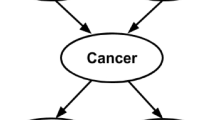Abstract
This paper concerns the extent to which uncertain propositional reasoning can track probabilistic reasoning, and addresses kinematic problems that extend the familiar Lottery paradox. An acceptance rule assigns to each Bayesian credal state p a propositional belief revision method \({\sf B}_{p}\), which specifies an initial belief state \({\sf B}_{p}(\top)\) that is revised to the new propositional belief state \({\sf B}(E)\) upon receipt of information E. An acceptance rule tracks Bayesian conditioning when \({\sf B}_{p}(E) = {\sf B}_{p|_{E}}(\top)\), for every E such that p(E) > 0; namely, when acceptance by propositional belief revision equals Bayesian conditioning followed by acceptance. Standard proposals for uncertain acceptance and belief revision do not track Bayesian conditioning. The “Lockean” rule that accepts propositions above a probability threshold is subject to the familiar lottery paradox (Kyburg 1961), and we show that it is also subject to new and more stubborn paradoxes when the tracking property is taken into account. Moreover, we show that the familiar AGM approach to belief revision (Harper, Synthese 30(1–2):221–262, 1975; Alchourrón et al., J Symb Log 50:510–530, 1985) cannot be realized in a sensible way by any uncertain acceptance rule that tracks Bayesian conditioning. Finally, we present a plausible, alternative approach that tracks Bayesian conditioning and avoids all of the paradoxes. It combines an odds-based acceptance rule proposed originally by Levi (1996) with a non-AGM belief revision method proposed originally by Shoham (1987).
Similar content being viewed by others
References
Alchourrón, C. E., Gärdenfors, P., & Makinson, D. (1985). On the logic of theory change: Partial meet contraction and revision functions. The Journal of Symbolic Logic, 50, 510–530.
Gettier, E. (1963). Is Justified true belief knowledge? Analysis, 23, 121–123.
Harper, W. (1975). Rational belief change, popper functions and counterfactuals. Synthese, 30(1–2), 221–262.
Kraus, S., Lehmann, D., & Magidor, M. (1990). Nonmonotonic reasoning, preferential models and cumulative logics. Artificial Intelligence, 44, 167–207.
Kyburg, H. (1961). Probability and the logic of rational belief. Middletown: Wesleyan University Press.
Lehrer, K. (1965). Knowledge, truth, and evidence. Analysis, 25, 168–175.
Leitgeb, H. (2010). Reducing belief simpliciter to degrees of belief. Presentation at the Opening Celebration of the Center for Formal Epistemology at Carnegie Mellon University in June 2010.
Levi, I. (1967). Gambling with truth: An essay on induction and the aims of science. New York: Harper & Row. 2nd ed. Cambridge, Mass.: The MIT Press, 1973.
Levi, I. (1996). For the sake of the argument: Ramsey test conditionals, inductive inference and non-monotonic reasoning. Cambridge: Cambridge University Press.
Lin, H., & Kelly, T. K. (2012). A geo-logical solution to the lottery paradox. Synthese, 186(2), 531–575.
Schervish, M. J., Seidenfeld, T., & Kadane, J. B. (1984). The extent of non-conglomerability of finitely additive probabilities. Zeitschrift fur Wahrscheinlictkeitstheorie und verwandte Gebiete, 66, 205–226.
Sellars, W. (1956). Empiricism and philosophy of mind. In H. Feigl, & M. Scriven (Eds.), The foundations of science and the concepts of psychoanalysis. Minnesota studies in the philosophy of science (Vol. I). Minneapolis, MN: University of Minnesota Press.
Shoham, Y. (1987). A semantical approach to nonmonotonic logics. In M. Ginsberg (Ed.), Readings in nonmonotonic reasoning. Los Altos, CA: Morgan Kauffman.
van Fraassen, B.C. (1984). Belief and the will. The Journal of Philosophy, 81(5), 235–256.
Author information
Authors and Affiliations
Corresponding author
Additional information
This work was supported generously by the National Science Foundation under grant 0750681 and the John Templeton Foundation under grant 24145. Any opinions, findings, and conclusions or recommendations expressed in this material are those of the authors and do not necessarily reflect the views of the National Science Foundation or the John Templeton Foundation.
Rights and permissions
About this article
Cite this article
Lin, H., Kelly, K.T. Propositional Reasoning that Tracks Probabilistic Reasoning. J Philos Logic 41, 957–981 (2012). https://doi.org/10.1007/s10992-012-9237-3
Received:
Accepted:
Published:
Issue Date:
DOI: https://doi.org/10.1007/s10992-012-9237-3




